Christmas has always been a favorite holiday for me.
When I was born, in 1939, at the end of the great depression, we lived with my maternal grandparents. My grandmother, Fannie (Feiga, originally) Levine, emigrated
by herself from what was Russia, now Ukraine, to come to New York, where some of her siblings already lived. She was 15 or 16 years old. Almost ten years later, in 1908, when she was 24, she married my grandfather, Louis (Lipa) Podberesky (later abbreviated to Podber by their children), one year her senior. They eventually settled in an apartment at 88 16th Street in Brooklyn, where they had three children, Hyman, my mother Alice, and Leo. My grandmother never 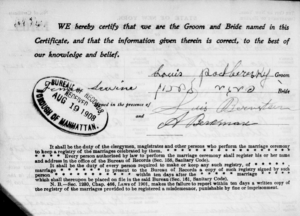 mastered writing in English, as you can see from her signature on their marriage license, although she spoke and read quite well.
mastered writing in English, as you can see from her signature on their marriage license, although she spoke and read quite well.
Beth David cemetery, in which Louis and Fannie lie, is about the same size as the grounds of the Belmont racetrack almost a mile away. It is past Forest Hills and five miles from JFK International Airport. On a Google map the cemetery stands out as a grim, battleship-gray irregular rectangle of land, almost directly in the middle of Elmont.
Fannie and Louie lie together. Their gravestones resemble each other—similar shape, same color—except for the inscriptions identifying each of them.
And except for the fact that Fannie’s gravestone is about a foot higher than that of Louis. One might think that difference is a metaphor for their size. It is not. It does not illustrate their physical height but, rather, the force of their personalities (inadvertently, I am sure). Louis was a quiet, gentle, learned man, a graduate of the great University of Vilnius, who avoided confrontation while Fannie was a tower of strength whose sense of right and wrong, whose moral code, was unconquerable.
A story about her, once told in an earlier posting, recounts her altering the policy of one of the most powerful newspapers in the United States.
It is worth telling again as a prelude to reminiscences about Christmas and losses. My grandparents owned what was then called a “candy store,” a little shop that sold, in addition to candy, ice cream, egg creams, stick pretzels, sodas, cigarettes, cigars, toys, magazines, greeting cards, comic books and newspapers. Their candy store was at 324 Church Avenue, a main throroughfare in Brooklyn, and was the place to buy a newspaper on the way from the big apartment buildings on Ocean Parkway to the subway station 6 blocks away on MacDonald Avenue. In the post-World War II years New York had many newspapers including the New York Post (once a great liberal newspaper that was founded by Alexander Hamilton), the New York Times, the Herald-Tribune, the Daily Mirror, the Journal-American, the Brooklyn Eagle, PM—many of them with morning and evening editions—a few foreign-language newspapers and the mighty Daily News which had the largest number of readers of any newspaper in the world. Subway commuters would stop at the store for their newspaper—I can still visualize the huge Daily News stack dwarfing all the other papers—and many also bought cigarettes, candy and other things.
In the early post-World War II years, it came to pass that a luncheonette was going to open across the street, with a sign in the window indicating that they would be selling newspapers. My grandmother—in her early sixties, obese and diabetic, in her plain black dress—got on the subway and went to 42nd Street in 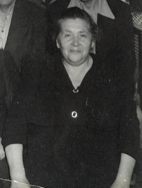 Manhattan, to the New York Daily News building (you can see it in the first Christopher Reeve Superman movie temporarily renamed the Daily Planet) to see the publisher, Walter Annenberg. She did not have an appointment and Mr. Annenberg’s secretary would not let her in. She sat there the whole day, even after the secretary went home, and finally, when he left his office at the end of the long day, got to see him to tell her story. He assured her that, as long as she lived, that luncheonette would not carry the Daily News.
Manhattan, to the New York Daily News building (you can see it in the first Christopher Reeve Superman movie temporarily renamed the Daily Planet) to see the publisher, Walter Annenberg. She did not have an appointment and Mr. Annenberg’s secretary would not let her in. She sat there the whole day, even after the secretary went home, and finally, when he left his office at the end of the long day, got to see him to tell her story. He assured her that, as long as she lived, that luncheonette would not carry the Daily News.
And it didn’t.
We lived in that same 16 Street apartment until my grandmother died and my father, mother, baby brother, Dennis, and I moved to Miami where we lived for only about six months (another story for another day …)
When my second Christmas came, I was no longer an infant and was then able to appreciate the world around me. My grandmother insisted on our having a real Christmas tree (I’m not sure artificial trees were available in those days) with tinsel and presents, despite our being one of the few Jewish families in the Gowanus part of Brooklyn. I think we also celebrated Chanukah, but I’m not completely sure of that. I knew the words to Adeste Fidelis (which I still mostly know) years before I knew the words to Dayenu. I suspect my grandmother, who never had higher education, but was, nonetheless, quite astute, tried to erase as many of her memories of her early years in Czarist Russia as possible.I don’t know if shet was a communist (at a time when many patriotic Americans were sympathetic to some of the goals of communism) but I wouldn’t be surprised. My grandmother was determined that her second grandchild, who was mostly under her tutelage since my mother and father worked, would be a real American. As far as she could see, in our mostly Catholic neighborhood, being American meant celebrating Christmas. Christmas week became particularly important for me.
There are so many questions I wish I could ask of those no longer alive. I write, in part, so that traces of me, and stories about some of the people I have known, remain. Blanche Glover, a writer who is a character in the brilliant novel, Possession, by A.S. Byatt, says, “Nothing endures for certain, but good art endures for a time, and I have wanted to be understood by those not yet born.” I know some of the tales of my family and, now and then, retell them in some form but, alas, most of the stories of my grandparents and parents, of so many relatives and friends, are forever lost.
This Christmas season is, for me, a little less cheerful than most of the ones I have enjoyed before. Indeed, there is background sense of foreboding as we approach 2025. I believe we Americans, no matter how we cast our vote, will soon be losing more than we gain. We have already lost our sense of national purpose and our will to do the best we can. We have lost truth as the underlying way of life for Americans.
I have just finished reading “Something Lost, Something Gained,” the latest book by Hillary Rodham Clinton, which prompted this essay. She is so knowledgeable, so thoughtful, so wise, so skilled and, yes, so witty. The book led me to think of the many things I have lost in my life, some of them because I am a part of America. I have long been an enthusiastic fan of Hillary Clinton and had the chance to chat with her at a Fall 1998 fundraiser for the then Senator, Carol Mosely Braun, herself an impressive American politician. Hillary noticed the saxophone pin in my lapel (Kate and I attended Bill Clinton’s first inauguration) and she came across a crowded room (filled with Hollywood and show business notables) to talk with me.
There are so many beloved relatives and friends, many of whose photographs surround me as I sit at my desk. The pictures mostly bring me good cheer, but they also make me sad, as I appreciate the deep meaning the first part of her book’s title. I often also think of the losses sustained by our country by all those alive since those turbulent sixties. John Kennedy was murdered on November 22, 1963. Martin Luther King and Bobby Kennedy in 1968.
And we lost considerably in the election of 2016 and again in 2024.
On page 7, Hillary writes: “I miss a time when truth mattered. I miss fact-based debates about policies to solve problems and improve lives. I miss the clear separation of church and state, once sacrosanct, now breached by culture warriors and Christian nationalists. I miss elections where everyone respects the will of the people, without sore losers and wannabe dictators.”
I miss those things also. 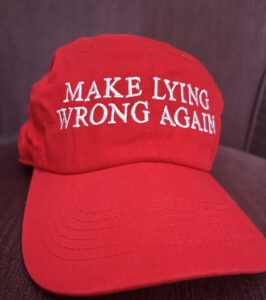
I remember well the vivid lessons my mother taught me about honesty, recounting George Washington’s cherry tree and Abe Lincoln walking a mile in the snow to return a penny. Lincoln wasn’t embedded in my brain as “President Lincoln.” He was “Honest Abe.” Will anyone ever associate the president-elect with the word “honest?” Inconceivable.
I have always believed that one of the most important roles a President should play is to inspire the people to do better things, to be better people, to make a better nation. We have been fortunate to have had a host of inspirational leaders: Washington, Jefferson, Lincoln, Teddy Roosevelt, Franklin Roosevelt, Bill Clinton, Barack Obama, others. The first time I was eligible to vote was in the 1960 election. It will always be a matter of pride that I helped elect John Fitzgerald Kennedy. Many of these men, if not all, had their flaws, but they all shared a commitment to abide by the law, to understand and follow The Constitution of the United States, to respect and honor the traditions of our country. We have also, in my lifetime, had men and women who failed to win the election but whose campaigns exhorted us to do better and to be better: Adlai Stevenson II, George McGovern, Hillary Clinton and, most recently, Kamala Harris. Will we be inspired by the president-elect and his followers? Inconceivable.
2016 was one of the greatest losses ever. We failed to elect someone who arguably was the most capable, most intelligent, most prepared person to ever seek the office of presidency. I have no doubt that in Hillary Clinton’s election loss, we lost the possibility of a new golden age for America and a better world. A similar, more frightening, loss occurred last month.
Eugene McCarthy (1916-2005) was an American writer, philosopher, academic and politician. As Senator, he sought the Democratic nomination for President four times, without success. A particularly powerful voice of the opposition to the Vietnam war, he said, “No one who is insensitive to poetry and song can have respect for learning, and no one who has no respect for learning can have real respect for justice, and no one who not does respect justice can, in fact, manifest a true love for his country.” There will be very few, if any, poets in the incoming administration. The songs will be those of the re-elected President’s supporters, Kanye West and Kid Rock. A Robert Frost or a Maya Angelou would not be welcome. A Pablo Casals would not be welcome. Pinchas Zuckerman, who played for Ronald Reagan, would not be welcome.
Hillary Clinton’s book was published before the votes were counted. She foresaw the possibility of Trump’s re-election. Throughout the book, however, she maintains a belief that things can be better; the second part of the book’s title is “… Something Gained.” Her book recounts, emphasizing the way she describes obstacles, the many opportunities she has had, the many things she has “gained,” in the face of adversity. I am not yet prepared to share her optimism but hope I am wrong. She reminds us, quoting the Talmud, that “You are not obligated to complete the work, but neither are you free to abandon it.” I understood this from my grandmother, after she trudged into Manhattan to defend her needs.
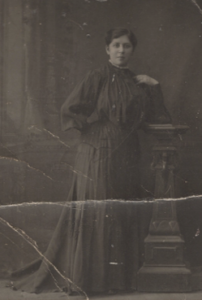
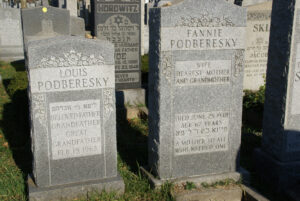

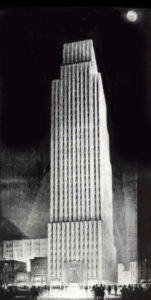
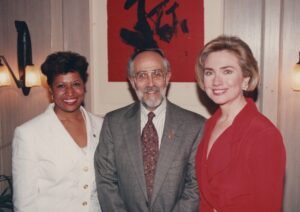
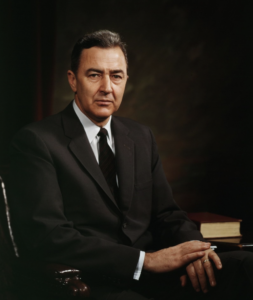

December 23, 2024 at 5:48 pm
Grannie was a good role model——-It is the least we can do as we age.
Herb Goldberg
December 23, 2024 at 9:27 pm
As usual, a thoughtful and thought provoking essay. But the part that resonated most with me was the description of your grandmother. So much like my maternal grandmother, actually the only grandparent I actually knew in person. An émigré from Eastern Europe, In her soft spoken but firm way, she made the decisions in the family, and they were usually good ones, especially financial ones. She was instrumental in the family staying close, her three children and all their children, getting together every Friday night and most Sundays. Maybe it’s just that the times have changed, but they don’t seem to make people like that anymore.